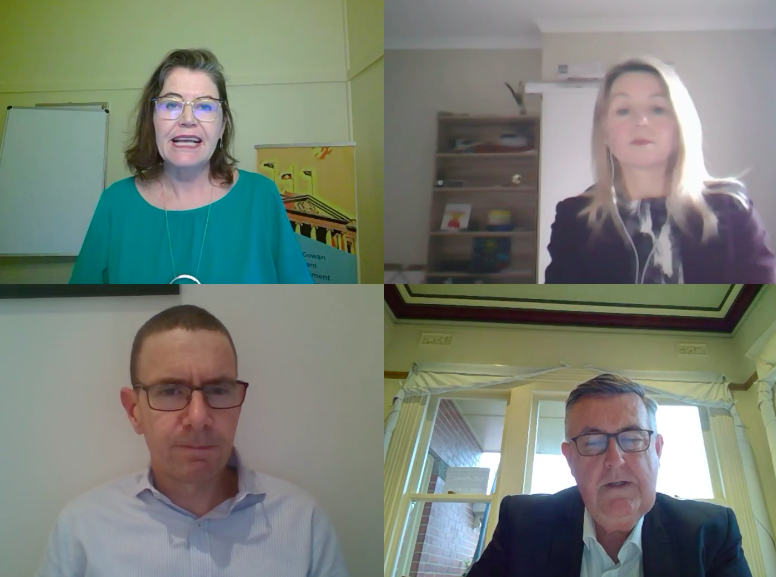
Four male CEOs from councils across Victoria are spearheading a gender equity campaign designed to help women break through the glass ceiling in local government.
Victoria’s new local government minister Shaun Leanne joined peak local government professionals organisation LGPro to launch the ‘Male Champions of Change’ campaign this week in his first official outing since being appointed.
Speaking at LGPro’s Women’s Professional Development Forum on Thursday, Mr Leane described the initiative, designed to redefine men’s role in taking action on gender equality, as “a game changer”.
“Having more women in senior positions makes for a better workplace, a smarter workplace, and a more harmonious workplace,” he said.
The forum heard that despite a high proportion of women in local government jobs, many fail to rise to senior positions in councils.
More than half of the administrative workforce in the local government sector is female, but just 34 per cent of women are directors and 39 per cent are managers. Only one in six chief executive officers of Victoria’s 79 councils are women.
Leadership and gender equality consultant Ruth McGowan told the panel that research has shown increasing the number of women in leadership positions can increase the market value of an organisation by 5 per cent.
“It makes sense on all fronts to boost women’s leadership,” she said.

The boys light up
CEOS to sign up include Andrew Day from Manningham City Council, Domenic Isola from Hume City Council, Glenn Patterson from City of Casey and Tony Doyle from Knox City Council.
Mr Day told the panel the evidence is clear that organisations who promote and achieve gender equity have better outcomes across a range of health, community and business indicators.
“Aside for the fact that its human rights issue, it just makes sense,” he said.
Mr Doyle said local government organisations should provide role models for the community.
“As a leader if I can just make a difference to a handful of people, we’re going to achieve significant change pretty quickly and I want to be a part of that,” he said.
“If you want your organisation to be the best it can be, you need all the women on your team to have the opportunities that they need to prosper and shine.”
Quotas, targets and the queen bees
The forum also heard that quotas and targets relating to positions held by women were an important factor in achieving gender equality.
“The reality is that part of the difficulty in getting women into those really senior levels is that are still a lot of unconscious biases and a lot of the decision makers are men and unintentionally carry those unconscious biases,” Russell Kennedy special counsel Samantha Taylor said.
“I think that quotas can play a role in helping redress some of the many, many years of systemic discrimination.”
Economics lecturer Dr Leonara Risse, who spoke about the need for councils to apply a “gender lense” to their operations, said it wasn’t always men doing the discrimination.
There’s such a thing as the queen bee syndrome where women have done well and have advanced and don’t really see themselves as being there to help others. They feel ‘I’ve done it on my own so you can be put through the wringer as well’.
“There’s such a thing as the queen bee syndrome where women have done well and have advanced and don’t really see themselves as being there to help others,” she told the forum.
“They feel ‘I’ve done it on my own so you can be put through the wringer as well’ and perhaps they’re even territorial about getting where they are.”
The Male Champions of Change Institute works with leaders from organisations around Australia.
Since starting in 2010 with eight Australian leaders, the MCC coalition now encompasses fifteen groups, amounting to more than 230 leaders across Australia.
LGPro’s launch of its campaign is a first for Australian local government and the organisation hopes to see more male CEOs sign up.
“The sector doesn’t have nearly enough women in senior management,” LGPro President Liana Thompson said.
“We are calling on all councils – especially CEOs – to tackle the problem from within.”
Comment below to have your say on this story.
If you have a news story or tip-off, get in touch at editorial@governmentnews.com.au.
Sign up to the Government News newsletter
As a person who originally had difficulty in seeking flexible work arrangements in a government setting, this would be a welcome change. It needs to be noted that if you are seeking to promote women into leadership levels, their family circumstances and flexibility must be afforded to them. I see too many women leave their education and careers to stay at home for their children and families because of the lack of flexibility in their workplace. They are often not taken seriously if they request a flexible work arrangement and a leadership role together. If the issue of flexible work arrangements can be sorted out, then you will find attracting talented and educated women to the workforce won’t be as big an issue.